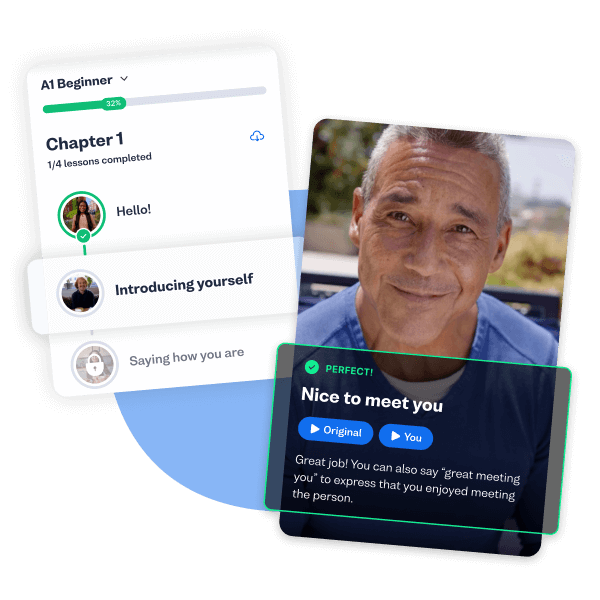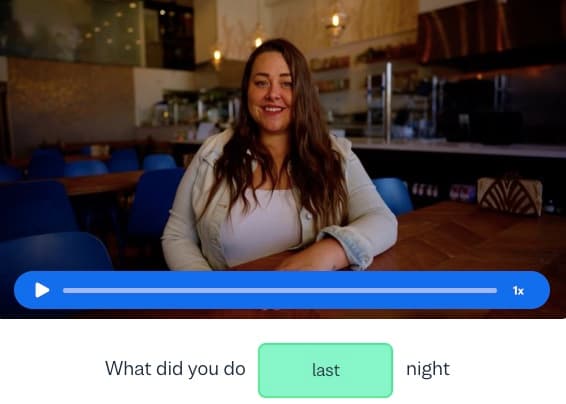I want to learn...
Let’s talk about sleep learning. When you start to learn a language, it can be tempting to look for shortcuts. After all, it takes time to learn! And it would be so nice to just jump to speaking fluently enough to have a conversation or read a book in a new language, right?
So, let’s talk about learning while sleeping. Is it even possible? Can you use it to your advantage? Here’s what you need to know.
Is it possible to learn a language in your sleep?
Well, no. You can’t learn a whole language in your sleep – it’s too complex. While plenty of studies have been done on sleep learning, the results have been generally inconclusive, and no one has been able to master tricky concepts like grammar rules in their sleep. But you may be able to help yourself along!
If you want to learn while you sleep, the one thing studies suggest you might be able to do is reinforce your vocabulary in a new language. You’ll still need to work on speaking out loud, reading, and more complicated linguistic concepts during your waking hours, but a leg up is a leg up!
Here’s how sleep learning works
Basically, learning a new language in your sleep is tricky because, when you sleep, it’s generally believed that you lack the conscious awareness and necessary brain chemistry to really learn. But your brain isn’t totally dormant.
Studies have found that words learned in your sleep won’t show up in general recall (you won’t, in your waking life, have the ability to distinguish words you’ve only heard while sleeping from new words), but that your brain makes memories – from the abstract of a 2016 study published in Neuroscience of Consciousness:“both behavioral and EEG data indicate the presence of an implicit memory trace for words presented during sleep.”
So, in short, you might not know that you’ve learned new words, but your brain will have already started making memories of them, which may make them easier to remember down the line.
How to try learning while sleeping
If you want to give learning a language in your sleep a shot (and hey, why not?), you should focus on beefing up your vocabulary.
While you may be able to find resources online in your language of choice, it’d be even better to record yourself (or a friend, if you hate the sound of your own voice) saying the words you want to remember and their definitions. That way, you get a tailored vocab lesson for your snoozing self!
If you learn with Busuu, you can use the Review function, which automatically gathers words you’ve stumbled on or struggled to remember in the past. It’s an easy way to quickly gather the words you most need to reinforce – whether you choose to review them awake or in your dreams is up to you.
But… there’s a better way to learn a language
The reality is, you can only get so far by trying to learn in your sleep. It might help you speed up things you’re struggling to learn, but a whole language is just too much to tackle from dreamland. So here are some pointers for how to give your language learning a boost:
Get a good night’s sleep – with or without a vocab lesson. Studies show that we learn as much as 40% less when we’re not well-rested than when we get a full night’s sleep – before and after studying. This is because our brains process memories during sleep. The more deep sleep we get, the more our memories can be processed and stabilized. The less deep sleep, the less we tend to retain.
Try getting some learning done right before bed. Studies suggest that you’re more likely to remember things you learned right before you went to sleep than things you learned in the morning.
Use tools designed to help you reach your goals (like Busuu!) to actually learn to speak a new language. You’ll learn a lot more by chatting with native speakers and taking lessons designed to teach than you would by turning a tape on and shutting your eyes.
You can use Busuu’s vocab review feature to make a list for your nightly sleep learning, if you’re so inclined – or just use it during the day to master tricky words you’ve stumbled on in past lessons and reviews.
AUTHOR

Barney Meekin
Newlanguages


